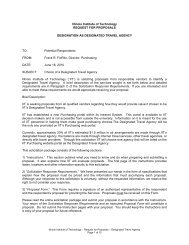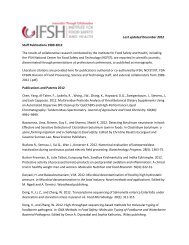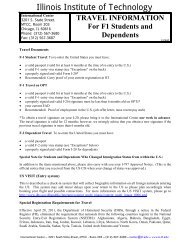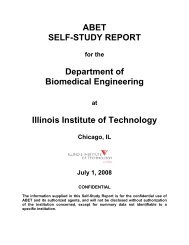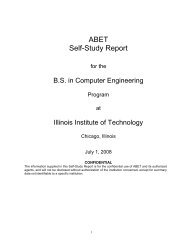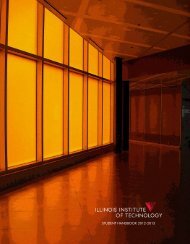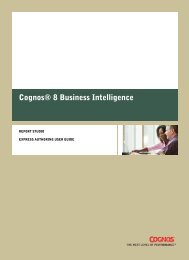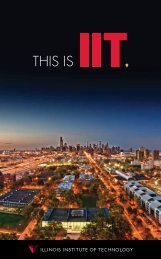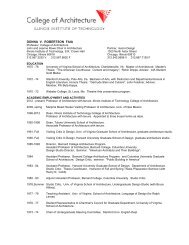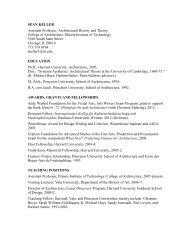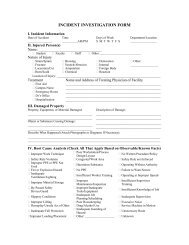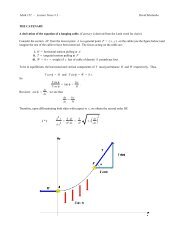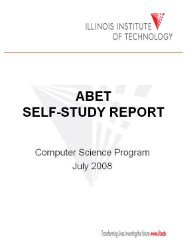Copyright & Disclaimer Information - Illinois Institute of Technology
Copyright & Disclaimer Information - Illinois Institute of Technology
Copyright & Disclaimer Information - Illinois Institute of Technology
Create successful ePaper yourself
Turn your PDF publications into a flip-book with our unique Google optimized e-Paper software.
<strong>Illinois</strong> <strong>Institute</strong> <strong>of</strong> <strong>Technology</strong><br />
CHE 202<br />
Material and Energy Balances<br />
Material and energy balances for<br />
engineering systems subjected to<br />
chemical and physical transformations.<br />
Calculations on industrial processes.<br />
Prerequisites: CS 105, MATH 152, and<br />
one semester <strong>of</strong> chemistry. (2-2-3) (C)<br />
IPRO 296<br />
introduction to IPRO<br />
Introduction to process design.<br />
Principles and techniques in effective<br />
team work. Performance <strong>of</strong> selected<br />
design tasks in project groups integrated<br />
with IPRO 496. Practice with<br />
process design s<strong>of</strong>tware. First part <strong>of</strong><br />
the IPRO 296-IPRO 496 project<br />
package. Only CHE students should<br />
register for this course. Prerequisite:<br />
CHE 101, CHE 202, or consent <strong>of</strong><br />
instructor. (0-2-1) (C)<br />
CHE 301<br />
Fluid Mechanics and<br />
Heat-Transfer Operations<br />
Flow <strong>of</strong> fluids and heat transfer.<br />
Fundamentals <strong>of</strong> fluid flow and heat<br />
transfer design equations as applied to<br />
selected unit operations. Prerequisites:<br />
CHE 202, MATH 252. Corequisites:<br />
CHEM 343, MATH 251. (3-0-3)<br />
CHE 302<br />
Mass-Transfer Operations<br />
Mass transfer in stagewise and<br />
continuous contacting equipment.<br />
Mass-transfer design equations as<br />
applied to selected unit operations.<br />
Unsteady state operations in masstransfer<br />
equipment. Prerequisite:<br />
CHE 301. (2-2-3)<br />
CHE 317<br />
Chemical Engineering Laboratory I<br />
Laboratory work in the unit operations<br />
<strong>of</strong> chemical engineering, fluid flow,<br />
heat transfer and other selected topics.<br />
Prerequisite: CHE 301. (1-3-2) (C)<br />
CHE 351<br />
Chemical Engineering<br />
Thermodynamics<br />
Laws <strong>of</strong> thermodynamics and their<br />
application to chemical engineering<br />
operations. Prerequisite: CHEM 343.<br />
(3-0-3)<br />
<strong>Copyright</strong> & <strong>Disclaimer</strong> <strong>Information</strong>: <strong>Copyright</strong> © 1994, 1995, 1996, 1997, 1998, 1999, 2000, 2001, 2002, 2003, 2004, 2005, 2006, 2007. CollegeSource®, Inc. and Career Guidance Foundation. CollegeSource® digital catalogs are derivative works owned and copyrighted by CollegeSource®, Inc. and Career Guidance Foundation. Catalog content is owned and copyrighted by the appropriate school. While CollegeSource®, Inc. and Career Guidance Foundation provides information as a service to the public, copyright is retained on all digital catalogs.<br />
<strong>Copyright</strong> & <strong>Disclaimer</strong> <strong>Information</strong>: <strong>Copyright</strong> © 1994, 1995, 1996, 1997, 1998, 1999, 2000, 2001, 2002, 2003, 2004, 2005, 2006, 2007. CollegeSource®, Inc. and Career Guidance Foundation. CollegeSource® digital catalogs are derivative works owned and copyrighted by CollegeSource®, Inc. and Career Guidance Foundation. Catalog content is owned and copyrighted by the appropriate school. While CollegeSource®, Inc. and Career Guidance Foundation provides information as a service to the public, copyright is retained on all digital catalogs.<br />
CHE 402<br />
Introduction to Microelectronics<br />
Fabrication <strong>Technology</strong><br />
Fundamentals <strong>of</strong> integrated circuit<br />
technology. Epitaxy and doping<br />
<strong>of</strong> epitaxial layers. Film deposition<br />
techniques. Bipolar and MOS integrated<br />
circuit devices. Integrated and<br />
hybrid circuit fabrication. (3-0-3)<br />
CHE 406<br />
Transport Phenomena<br />
The equations <strong>of</strong> change in different<br />
coordinate systems (mass, momentum,<br />
and energy transport). Velocity distribution<br />
in laminar and turbulent flow.<br />
Formulation and analytical solutions to<br />
the problems <strong>of</strong> viscous flow, molecular<br />
diffusion, heat conduction and convection.<br />
Prerequisites: CHE 301, CHE<br />
302, MATH 252. (3-0-3)<br />
CHE 411<br />
Introduction to Bioengineering<br />
Transport phenomenon and reaction<br />
kinetics. Application <strong>of</strong> engineering<br />
principles to biochemical and biomedical<br />
systems. Biochemical topics include:<br />
microbial pathways, biological systems,<br />
evergetics and control systems, enzyme<br />
and macrobial kinetics, and the design<br />
and analysis <strong>of</strong> biological reactors.<br />
Biomedical topics include: flow properties<br />
<strong>of</strong> blood, transport in the human<br />
cardiovascular system, and the analysis<br />
and design <strong>of</strong> organ functions including<br />
the kidney and lung, Prerequisites:<br />
CHE 301, CHE 302. Corequisite:<br />
CHE 423. (3-0-3)<br />
CHE 418<br />
Chemical Engineering Laboratory II<br />
Laboratory work in distillation,<br />
humidification, drying, gas absorption,<br />
filtration and other areas. Prerequisites:<br />
CHE 302, CHE 317. Corequisite:<br />
CHEM 247. (1-3-2) (C)<br />
CHE 423<br />
Chemical Reaction Engineering<br />
Introduction to the fundamentals<br />
<strong>of</strong> chemical kinetics. The design, comparison<br />
and economic evaluation <strong>of</strong><br />
chemical reactors. Emphasis on homogeneous<br />
systems. Prerequisites: CHE 302,<br />
CHE 351, CHE 433. (2-2-3)<br />
Course Descriptions<br />
CHE 426<br />
Statistical Tools for Engineers<br />
Descriptive statistics and graphs, probability<br />
distributions, random sampling,<br />
independence, significance tests, design<br />
<strong>of</strong> experiments, regression, time-series<br />
analysis, statistical process control, and<br />
introduction to multivariate analysis.<br />
Prerequisite: Junior standing. (3-0-3)<br />
CHE 430<br />
Petrochemical Process<br />
Operations and Design<br />
Chemical and engineering aspects<br />
<strong>of</strong> current petrochemical and petroleum<br />
refining processes will be emphasized,<br />
including chemical conversions (catalytic<br />
and thermal), physical separations, and<br />
evaluation <strong>of</strong> alternatives. Design and<br />
simulation <strong>of</strong> refinery separation systems<br />
with emphasis on distillation columns.<br />
Prerequisite: CHE 494. (3-0-3)<br />
CHE 431<br />
Artificial Intelligence<br />
Applications in Engineering<br />
Knowledge-based system (KBS)<br />
architecture, knowledge representation,<br />
inferencing strategies. Real-time KBS.<br />
Commercial KBS shells. Neural<br />
networks, backpropagation, radial basis<br />
functions, recurrent neural networks.<br />
Applications in product design, process<br />
modeling, diagnosis, and control.<br />
Prerequisite: Consent <strong>of</strong> the instructor.<br />
(3-0-3)<br />
CHE 433<br />
Process Modeling<br />
and System Theory<br />
Principles <strong>of</strong> process modeling.<br />
Modeling <strong>of</strong> non-reactive and reactive<br />
dynamic processes. Transfer functions.<br />
Modeling <strong>of</strong> multistage and non-linear<br />
processes. Discrete-event processes,<br />
Markov processes, and automata theory.<br />
Prerequisite: CHE 301. Corequisites:<br />
CHE 302, CHE 351. (2-2-3)<br />
CHE 435<br />
Process Control<br />
Dynamic process models, stability<br />
assessment, feedback and feedforward<br />
control strategies, design and tuning<br />
<strong>of</strong> closed-loop controllers, time domain<br />
and frequency domain design and<br />
performance assessment methods.<br />
Multivariable systems, interaction,<br />
multi-loop control. S<strong>of</strong>tware for<br />
IIT Undergraduate Bulletin 1999-2001 125



